The Supreme Court on Oct. 21 rejected a request from former Trump attorney Michael Cohen to hear his case alleging retaliation by his ex-boss.
The court’s rejection was part of a longer order list and didn’t include any explanation. Cohen had argued that two lower courts wrongly dismissed a claim that former President Donald Trump violated his rights by ending his prison furlough during the COVID-19 pandemic.





